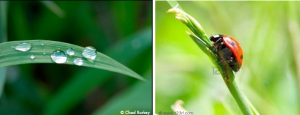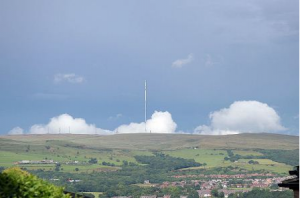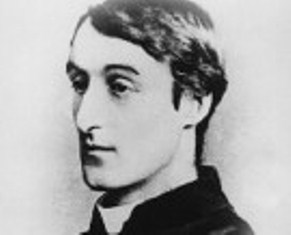One day recently, I met an elderly man who had undergone a tracheotomy and, as a consequence, was on oxygen, permanently. Wherever he went, he had to go with a heavy oxygen bottle, and this meant he could not go very far away from base. I asked him how life was for him, and he told me that once he got up, he used to go into the garden, sit on a favourite seat and look down into the grass.
 |
There, he saw things he had never seen before, and he loved watching insects, bugs and small spider’s webs – a multitude of life-forms, all taking place before his eyes in that mini-world. He said he had never had the time to see, and enjoy, such things until he became ill.
 |
Winter Hill from Blackrod
When I was a younger man, one of my favourite rest day’s relaxation was to go rambling the local Lancashire hills, to White Coppice, near Chorley, or over the moors by Winter Hill and the radio / TV mast – by now more than likely covered with mobile phones’ antennae, too. Jack Frodsham and I oftentimes set off alone together, and with our ‘butties’ and ‘flasks’, we would be as happy as ‘sand-boys’, no matter the weather – sunshine or rain. My friend, Jack, used to say: “Never let the weather put you off, whatever it is – just get out and go”, and I think that advice was good, for, in our climate of changing Lancashire weather patterns, one must ask, would we dare to venture out at all, on most days? Jack did not need any guide books; he knew all the foot-paths and by-ways by heart, as he had been walking – on doctor’s advice – for many years. This came about, above all, because he had suffered a heart attack, and his doctor had advised him to take exercise, especially walking.
One day, I remember, we were up on the moors, somewhere above Abbey Village, and he turned to me and said: “No money could buy what I have. I have greater wealth than any millionaire. Look at this wonderful view, breathe in the pure air, feel the freedom, and at the same time I have a wonderful wife and family, so what more could I want?”
It was a great joy to walk with Jack and to have his company – in silence, as well as in conversation – and after he died, there was a sad sense of loss. Then, he was missing from his usual place in Church, and even today, his walking boots are still by the side of his gravestone in our cemetery, now seriously weather-beaten, some 20 years since he last used them.
All this puts me very much in mind of the following well known quotation:
“Look at the birds of the air; they neither sow nor reap nor gather into barns, and yet your heavenly Father feeds them. Are you not of more value than they?..Consider the lilies of the field, how they grow; they neither toil nor spin, yet I tell you, even Solomon in all his glory was not clothed like one of these. But if God so clothes the grass of the field, which is alive today and tomorrow is thrown into the oven, will he not much more clothe you – you of little faith?” (Mt. 6: ; 26, 28 – 30)
Jesus, quite definitely, asks us to look at what is around us, to consider all the beautiful things we see, and for my part, I can readily understand why people at the sea-shore stare and enjoy the sea-gulls, why those ducks on the pond in ‘Shrugs Wood’ give so much pleasure, why the leaves of the trees bud, live and die, the blue sky in all its wonderful varietal forms, with clouds changing shapes – I know of people who play games identifying their shapes and what they look like – so fascinating! But then, we need little ‘romantic’ imagination, to allow ourselves to identify with what is already there in the glowing, friendly, eyes of a child, the affection of the bent, old gentleman, with a gnarled face and lines of wisdom, etched so deeply; then, we may ask ourselves; “Do we believe”, based on what we see, what we observe, deeply, and what we then think? There is so much to learn about all that we see, about all the things around us, and how all this affects us, from ‘cradle to grave’.
Gerald Manley Hopkins got it right in this poem – though, I agree, it may not be to everyone’s taste or understanding. He wrote it in the beautiful Welsh countryside, when at St. Beuno’s, in 1877, and he thought it might be his best poem.
 |
Gerald Manley Hopkins
The Windhover – To Christ Our Lord
I caught this morning morning’s minion,
Kingdom of daylight’s dauphin, dapple-dawn-drawn Falcon, in his riding
Of the rolling level underneath him steady air, and striding
High there, how he rung upon the rein of a wimpling wing
In his ecstasy! then off, off forth on a swing,
As a skate’s heel sweeps smooth on a bow-bend: the hurl and gliding
Rebuffed the big wind. My heart in hiding
Stirred for a bird, —the achieve of; the mastery of the thing!
Brute beauty and valour and act, oh, air, pride, plume, here
Buckle! AND the fire that breaks from thee then, a billion
Times told lovelier, more dangerous, O my chevalier!
No wonder of it: sheer plod makes plough down sillion
Shine, and blue-bleak embers, ah my dear,
Fall, gall themselves, and gash gold-vermilion.
 |
(Unfortunately, in sending out this blog by e-mail, ‘Word Press’ distorts the original
formatting of the document. Readers are, therefore, advised to visit the website
www.stmarysblog.co.uk should they wish to read it in its intended format).
